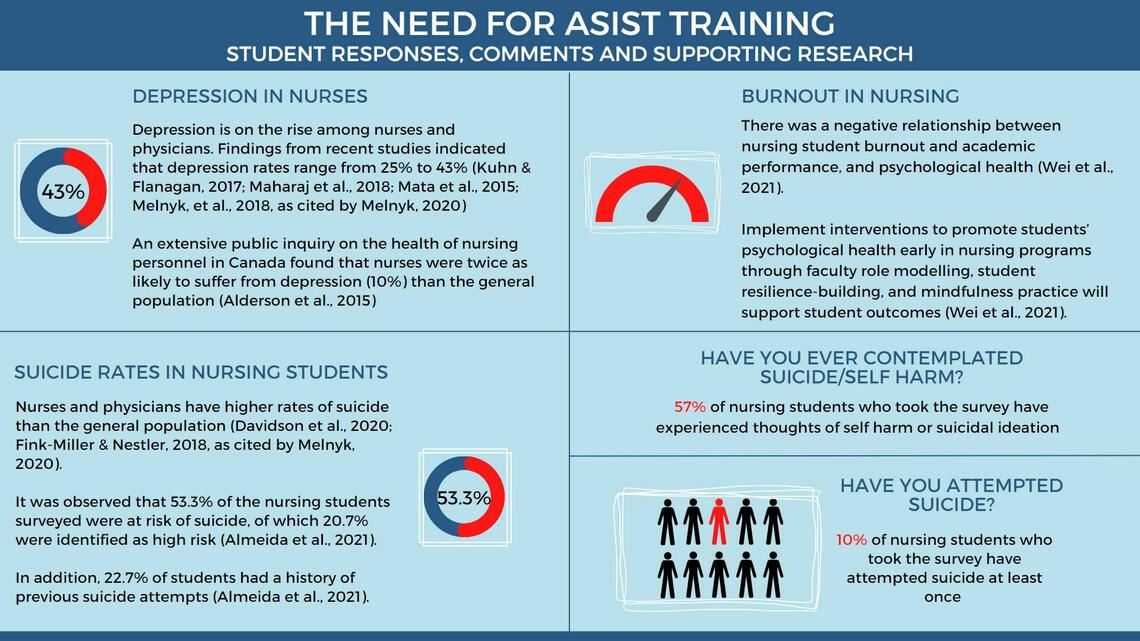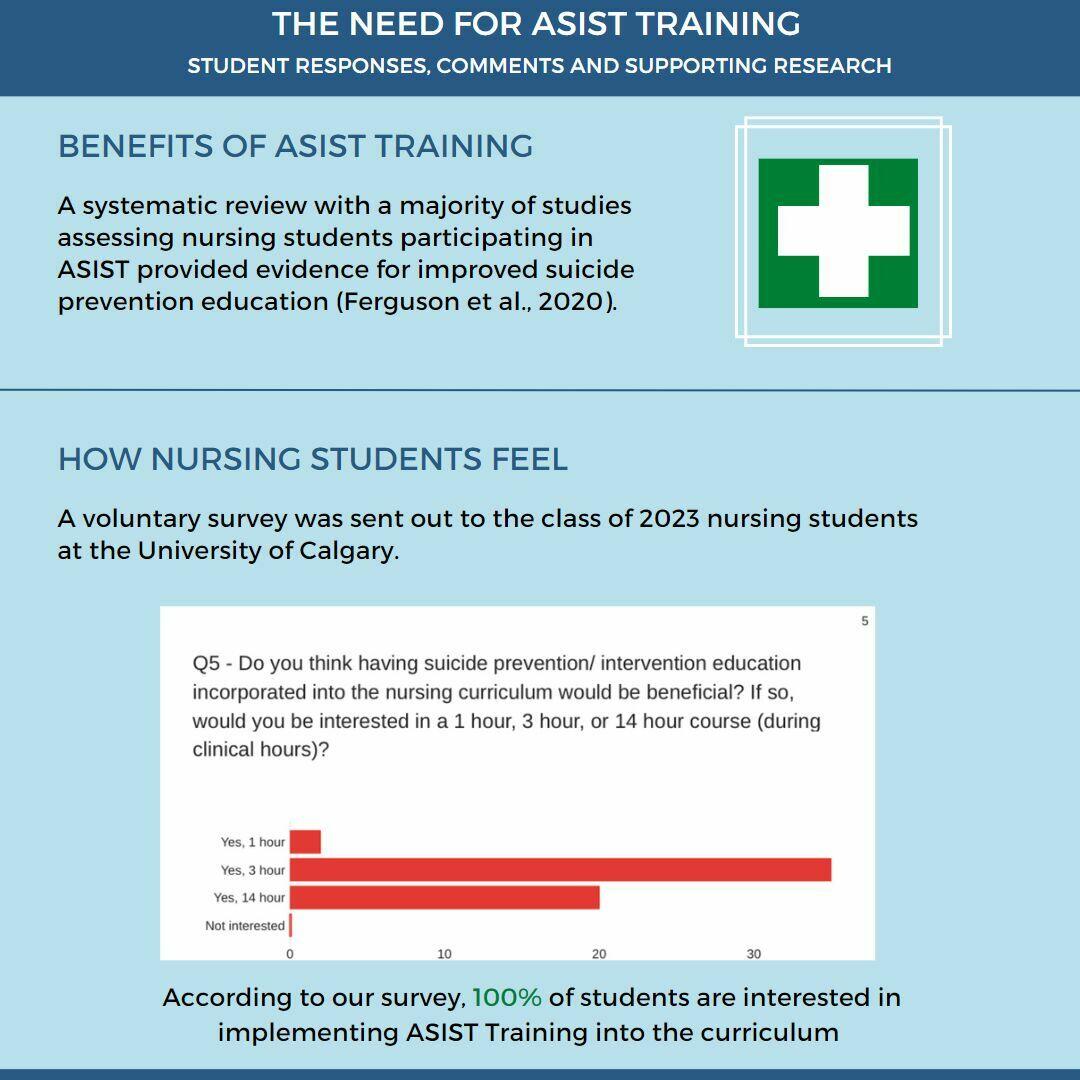Nov. 9, 2023
Suicide prevention education and training critical for nursing students

Suicide is an important public health issue in Canada and affects people of all backgrounds with the best practice for its prevention being education. However, suicide prevention training is not often integrated in undergraduate nursing education.
In 2019, the Faculty of Nursing was inspired by then undergraduate nursing student Candace Cho to bring ASIST (Applied Suicide Intervention Skills Training) to its faculty, staff, and students. On the heels of dealing with the suicide attempt of a fellow student in 2018, Cho found it difficult to find resources around suicide prevention, de-escalation strategies, and upstream prevention strategies for protecting the mental wellness of postsecondary students.
In the paper “A commentary on suicide prevention training: The process of implementing an ASIST pilot in postsecondary nursing education” published in the journal Teaching and Learning in Nursing, Cho reported “I was just scared and felt completely untrained and unprepared for what I was witnessing. I felt so lost and was overwhelmed with feelings of guilt and responsibility. I wanted to finish my nursing education, and grow to be a confident nurse, and so I started my own recovery process. It felt like suicide was this pandemic that nobody was talking about.”
In the process of seeking resources, Cho found ASIST, the most widely-used, acclaimed and researched suicide intervention training workshop in the world. It’s a two-day interactive workshop in suicide first aid that provides attendees with the training to intervene when an individual is thinking about suicide and includes life promotion and self-care for those at risk.
“I was adamant that ASIST needed to be one of those training programs written into nursing curriculum...and ultimately [this] led to my application for a student grant to remove the financial barrier of ASIST and guarantee ASIST training for all nursing students at the University of Calgary.”
In 2019, Cho successfully applied for the SU Quality Money fund to help bring ASIST to UCalgary nursing students and approached the nursing dean, Dr. Sandra Davidson, who connected her with mental health researcher Dr. Jacqueline Smith. (Students, in the past, have applied for - and received - funding for suicide prevention training, but not at a sustainable and ongoing level.)
That was the catalyst for the ASIST pilot project where these workshops are now provided free of charge ($250 value) to UCalgary Nursing students, faculty and staff several times a year. Each session is capped at 30 attendees. The sessions are counted as a co-curricular activity for nursing students and as professional development for faculty and staff.
“Our goal is to have every undergraduate nursing student graduate the program with that ASIST training,” says Jacqueline Smith, principal investigator of the ASIST Pilot Project.
Currently, the ASIST Pilot Project is funded by UCalgary Student’s Union Quality Money Grant, the City of Calgary: Change Can’t Wait, UCalgary’s Campus Mental Health Strategy, and the Centre for Suicide Prevention. The upcoming November workshops on Nov. 25 and 26 will be the 12th workshop the Faculty of Nursing has hosted since it started.

Inforgraphics created by former ASIST summer student Athena Lui regarding depression, suicide rates in nursing students, need for ASIST training and burnout in nursing.
While ASIST workshops previously were facilitated by external facilitators from the Centre for Suicide Prevention, thanks to funds from the City of Calgary’s Change Can’t Wait program, the Faculty of Nursing now has in-house trainers. Dr. Graham McCaffrey (associate professor), Heidi Smith (sessional instructor) and Jennifer Smith (research associate) have all been certified as ASIST trainers.
“It’s a fairly intense weekend but it's a great workshop. It's two full days of content but there's lots of experiential learning as well,” says Jennifer Smith. She describes the days as a mix of group work, videos, and discussions. By working through scenarios, participants learn to recognize signs of, and create a safety plan to support individuals with suicidal ideation.
“People are really finding it useful. This is something that they feel nursing students should have and it's really important to their practice because encountering mental health issues or people with thoughts of suicide isn't just something you encounter in a mental health unit. When you're a nurse, it could be literally anywhere,” Smith adds.
Undergraduate nursing students Tithi Patel and Thien Tran both have been volunteering to support ASIST workshops since 2021. “I really like the practical scenarios in the program because it provides me an opportunity to learn, practice, and provide appropriate interventions with patients who have suicidal thoughts,” Tran comments.

“I have seen people who go into the training with little idea about how they would go about approaching or conversing with a person with suicidal ideation,” adds Patel, “and they come out with great insight and confidence about this very important skill. It's the CPR of mental health. One can literally save lives.”
While Student Wellness Services does offer ASIST workshops to the entire UCalgary campus community, these ASIST workshops at Faculty of Nursing help to ensure nursing students have easy access to this resource.
Jacqueline Smith says there are also ongoing discussions with AHS psychiatrist Dr. Eric Chan to look at collaborating on how to make the suicide intervention training program more health-care provider specific for frontline workers in medicine, nursing, psychology and social work in an interprofessional education initiative.
“As nurses, we are looked at as professionals who are trained to help: we're caregivers. And so naturally people are inclined to reach out to us when they're in distress. We need to be advocates for this and be able to be prepared for when someone approaches us who needs help.”
The next scheduled ASIST training session is Nov 25 & 26. For more information and to register, visit the webpage.

